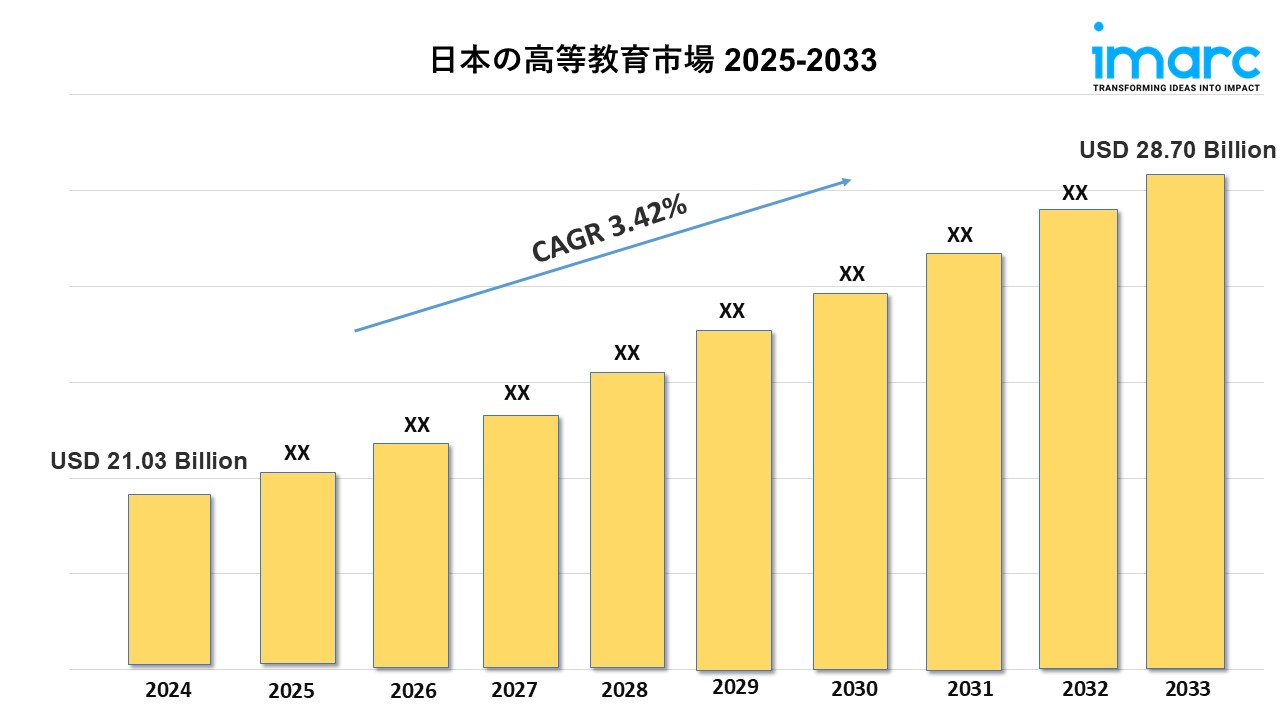
Japan Higher Education Size and Growth Overview (2025-2033)
Market Size in 2024: USD 21.03 Billion
Market Forecast in 2033: USD 28.70 Billion
Market Growth Rate 2025-2033: 3.42%
According to the latest report by IMARC Group, “The Japan higher education market size reached USD 21.03 Billion in 2024. Looking forward, IMARC Group expects the market to reach USD 28.70 Billion by 2033, exhibiting a growth rate (CAGR) of 3.42% during 2025-2033.”
Download a sample PDF of this report: https://www.imarcgroup.com/japan-higher-education-market/requestsample
How AI is Reshaping the Future of the Japan Higher Education Market
Artificial intelligence is fundamentally transforming Japan’s higher education landscape, introducing personalized learning experiences and administrative efficiencies that address longstanding challenges in the academic sector. AI-powered adaptive learning platforms analyze individual student performance, learning styles, and comprehension rates to create customized educational pathways that optimize knowledge retention and academic success. These intelligent systems identify struggling students early through pattern recognition in assignment submissions, test scores, and engagement metrics, enabling timely interventions that prevent dropouts and improve graduation rates. Japanese universities are deploying AI-driven language learning tools that provide real-time feedback on pronunciation, grammar, and conversational fluency, addressing critical needs for English proficiency enhancement among Japanese students preparing for global careers.
Administrative automation through artificial intelligence is revolutionizing university operations, from admissions processing and student information management to resource allocation and campus security. Machine learning algorithms predict enrollment patterns, optimize course scheduling, and forecast infrastructure requirements, enabling universities to allocate resources more efficiently in an era of declining domestic student populations. AI-powered proctoring systems maintain academic integrity in online examinations by monitoring student behavior, detecting potential cheating patterns, and verifying identity without human intervention. Natural language processing chatbots provide 24/7 student support, answering questions about admissions, course registration, financial aid, and campus services in multiple languages, dramatically reducing administrative burdens while improving student satisfaction. These technologies are particularly valuable as Japanese universities compete to attract international students and enhance their global reputations.
Research capabilities are being exponentially enhanced through AI-powered data analysis tools that process vast datasets, identify patterns invisible to human researchers, and accelerate scientific discovery across disciplines. AI assists in literature reviews by analyzing thousands of academic papers, extracting relevant findings, and synthesizing research trends. Predictive models help universities identify promising research directions, optimize grant applications, and facilitate interdisciplinary collaborations by connecting researchers with complementary expertise. Virtual reality and AI-powered simulations create immersive learning environments for medical, engineering, and science programs, providing hands-on training experiences without expensive physical laboratories. As Japan faces the challenge of maintaining academic excellence with constrained budgets and declining youth populations, AI technology enables universities to deliver superior educational outcomes more efficiently while positioning Japanese higher education institutions as technology leaders in the global academic community.
Japan Higher Education Market Trends & Drivers
The Japan higher education market is experiencing significant transformation driven by demographic shifts and the urgent need for workforce reskilling to meet evolving economic demands. Japan’s declining birth rate has created intense competition among universities for a shrinking pool of domestic students, with the 18-year-old population projected to decrease from 1.2 million in 2020 to approximately 880,000 by 2033. This demographic reality is forcing institutions to differentiate through specialized programs, enhanced student services, and international recruitment strategies. government’s ambitious goal to train 4.5 million people annually in digital skills by 2025 is driving massive investments in technology-focused curricula and online learning infrastructure to address the projected shortage of 8 million IT professionals by 2030. Universities are partnering with corporations to develop industry-aligned programs that provide students with immediately skills applicable in artificial intelligence, data science, cybersecurity, and digital transformation.
The internationalization of Japanese higher education is accelerating, with universities actively recruiting international students and developing English-language degree programs to compete globally. The Top Global University Project supports institutions in enhancing their international visibility and research capabilities, driving investments in bilingual faculty, global partnerships, and cross-cultural programs. The rise of online and blended learning models represents a fundamental shift from traditional classroom-based instruction, universities with deploying learning management systems, open massive online courses, and virtual classrooms that extend educational access beyond geographic constraints. Cloud-based education technology enables seamless collaboration between students and faculty regardless of location, particularly valuable for working professionals pursuing advanced degrees while maintaining careers. Growing emphasis on lifelong learning and professional development is creating demand for flexible, modular programs that allow individuals to acquire specific and credentials without committing to traditional four-year degrees, reshaping university offerings to accommodate diverse learner skills and preferences.
Japan Higher Education Industry Segmentation
The report has segmented the market into the following categories:
Breakup by Component:
- Solutions
- Student Information Management System
- Content Collaboration
- Data Security and Compliance
- Campus Management
- Others
- japan higher education market services
- Managed Services
- Professional Services
Breakup by Deployment Mode:
- On-premises
- Cloud-based
Breakup by Course Type:
- Arts
- Economics
- Engineering
- Law
- Science
- Others
Breakup by Learning Type:
- Online
- Offline
Breakup by End User:
- State Universities
- Community Colleges
- Private Colleges
Breakup by Region:
- Kanto Region
- Kinki Region
- Central/Chubu Region
- Kyushu-Okinawa Region
- Tohoku Region
- Chugoku Region
- Hokkaido Region
- Shikoku Region
Request a Customized Version of This Report for Deeper Insights: https://www.imarcgroup.com/request?type=report&id=18020&flag=E
Competitive Landscape:
The market research report offers an in-depth analysis of the competitive landscape, covering market structure, key player positioning, top winning strategies, a competitive dashboard, and a company evaluation quadrant. Additionally, detailed profiles of all major companies are included.
Recent News and Developments in Japan Higher Education Market
- August 2025: Approximately 60 companies, organizations, and government agencies conducted office tours for female junior and senior high school students in Tokyo to promote careers in science and technology fields. This initiative reflects growing efforts to address gender disparities in STEM education and increase female enrollment in technology-focused university programs across Japan.
- April 2025: The University of Tokyo rose to 28th place in the Times Higher Education World University Rankings 2025, demonstrating Japan’s continued academic excellence on the global stage. Tohoku University maintained its position as Japan’s top institution in domestic rankings, with Tokyo Institute of Technology advancing two places, reflecting ongoing investments in research quality and international collaboration.
- April 2025: Japanese universities expanded adoption of blended learning models and massive open online courses to broaden educational access and accommodate diverse student populations. This digital transformation enables institutions to reach working professionals, international students, and lifelong learners while optimizing campus resource utilization and reducing operational costs.
Future Outlook
The Japan higher education market will experience steady growth through 2033, driven by digital transformation, international student recruitment, and the evolution toward flexible, based learning models. The integration of artificial intelligence, virtual reality, and advanced learning analytics will enable highly personalized educational experiences that improve outcomes while reducing costs. student populations throughout their careers.
Key highlights of the Report:
- Market Performance (2019-2024)
- Market Outlook (2025-2033)
- COVID-19 Impact on the Market
- Porter’s Five Forces Analysis
- Strategic Recommendations
- Historical, Current and Future Market Trends
- Market Drivers and Success Factors
- SWOT Analysis
- Market Structure
- Value Chain Analysis
- Comprehensive Mapping of the Competitive Landscape
Note: If you require specific details, data, or insights that are not currently included in the scope of this report, we are happy to accommodate your request. As part of our customization service, we will gather and provide the additional information you need, tailored to your specific requirements. Please let us know your exact needs, and we will ensure the report is updated accordingly to meet your expectations.
About Us:
IMARC Group is a global management consulting firm that helps the world’s most ambitious changemakers to create a lasting impact. The company provides a comprehensive suite of market entry and expansion services. IMARC offerings include thorough market assessment, feasibility studies, company incorporation assistance, factory setup support, regulatory approvals and licensing navigation, branding, marketing and sales strategies, competitive landscape and benchmarking analyzes, pricing and cost research, and procurement research.
Contact Us:
IMARC Group
sales@imarcgroup.com
563-13 Kamien, Iwata City Country, SHIZUOKA, JP, 4380111
+1-631-791-1145




